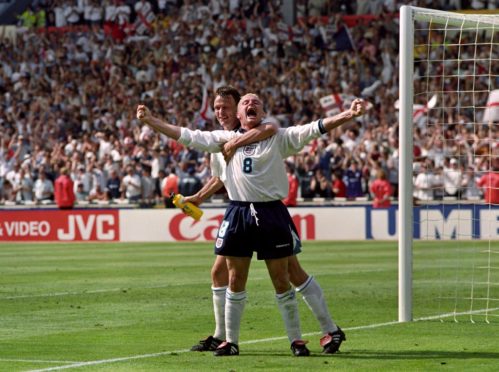It sounds as if I had wandered into an episode of The Twilight Zone.
How else could I have managed to watch Scotland’s rugby and football teams being beaten by New Zealand and England 25 years ago this summer when both games kicked off at 3pm?
Yet the answer is straightforward for anybody who has grappled with the substantial time difference between the Northern and Southern Hemispheres.
Having travelled to the Land of the Long White Cloud to cover the Scots’ two-Test series against the All Black in 1996, I found myself at Carisbrook in Dunedin on Saturday, June 15, and sat through a contest with 11 tries, and a bravura showing from 20-year-old Christian Cullen.
I had already agreed to check out another assignment later in the evening – or rather in the early hours of the following morning, when Scotland met England in the European Championship at Wembley: a fixture which will be staged again in the 2021 tournament next month.
But, considering that the battle of the Auld Enemies didn’t commence until 2am on Sunday in New Zealand, this was always one of those weekends with the potential to become the sporting equivalent of slow water torture.
On our way to Carisbrook, Bill McLaren was in typically fine fettle. He had done his homework meticulously on both sides and was purring at the prospect of watching Cullen for the first time.
“He scored a hat-trick on his Test debut against Samoa, and I’ve heard a lot of great things about him,” said the Hawick maestro.
His words were prophetic once we sat through Flower of Scotland and the Haka in front of more than 30,000 New Zealand aficionados.
These fans were witheringly critical of any mistakes from their heroes, even though they recorded a 62-31 victory. And while the travelling press corps marvelled at the mesmerising skill of Cullen, who scored four tries, the supporters regularly vented displeasure at any weakness from the All Blacks.
It highlighted the gulf between the expectations of both combatants. The Kiwis amassed eight tries, but there was plenty of grousing from the stands.
One of the home journalists later asked Sean Fitzpatrick if he was concerned that his men had conceded 31 points. The skipper looked surprised at the question, but admitted there had been some slackness in his team’s defence and he was vexed by their lack of killer instinct.
It was a stark reminder of the astonishing standards these fellows set themselves. Even a 30-plus-point win wasn’t sufficient.
A small group of Scots, who hadn’t been expecting anything from the rugby, but journeyed thousands of miles to follow their team, subsequently gathered in Dunedin hotels to see whether there might be better news at Wembley.
I wasn’t among their number. Instead, I was en route to a little community outside Dunedin – called Hampden! I thought it might be amusing to file a report from a setting named after Scotland’s national stadium, but the idea was better in theory than practice.
There was, for instance, the fact that the football didn’t start until 11 hours after the rugby. The locals were safely tucked up in their beds. Nor did it help that this particular Hampden was effectively a one-horse town.
The taxi driver had no access to GPS and, eventually, we found ourselves in the middle of nowhere, with the road becoming increasingly frosty (it was winter in New Zealand and my flight to Dunedin from Auckland the previous week had been cancelled because of a blizzard).
So far, so exasperating. But there was still the exquisite agony to endure of sitting through another painful experience as Scotland slipped to a 2-0 reverse in London.
At the Pacific Park Motel, we wondered if our long vigil would reap dividends, but, of course, it turned into another of the familiar hard-luck stories which permeate our sporting culture.
The Saltire-clad supporters remained upbeat, even when Alan Shearer latched onto Gary Neville’s cross to put his team in front.
But even the most optimistic in their ranks slumped when Gary McAllister missed a penalty and Paul Gascoigne scored a magical goal to double his side’s advantage.
Gazza, a man who didn’t so much live as if there was no tomorrow, but precious little left of today, latched on to the ball, lobbed it over Colin Hendry, and then caught it on the volley to score past his Rangers colleague, Andy Goram. It was sublime and, as Hendry said: “You’ve got to hold up your hands at times and just admit it was a great piece of skill.”
There was no arguing with that analysis, but it didn’t diminish the deflation. The fans could drown their sorrows, but I had to provide some colour and send it over by the now-archaic method of telephoning a copytaker in Edinburgh – where it was around 6pm on Saturday night.
At last, once I had finished and headed for an early breakfast, there was some recompense when the jazz standard Manhattan came on in the lounge.
But here was another kicker. ”It’s sad news, isn’t it?” said one of the waitresses. “She was one of the greats.” And that was when I discovered Ella Fitzgerald had died.
Yes, it was definitely a weekend to forget!
